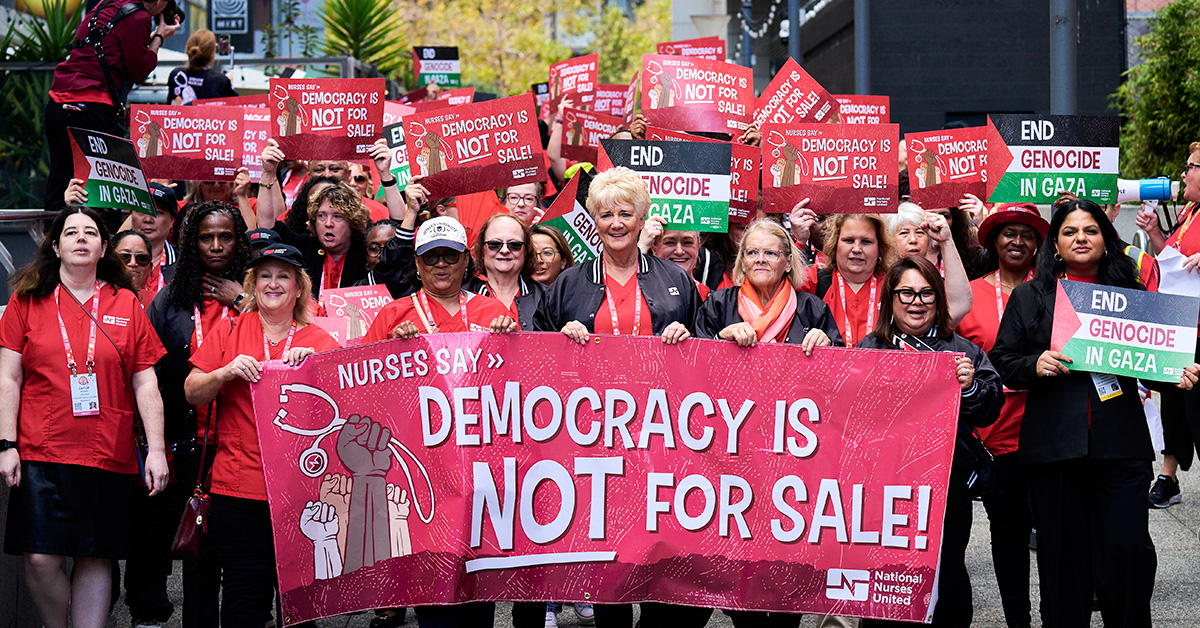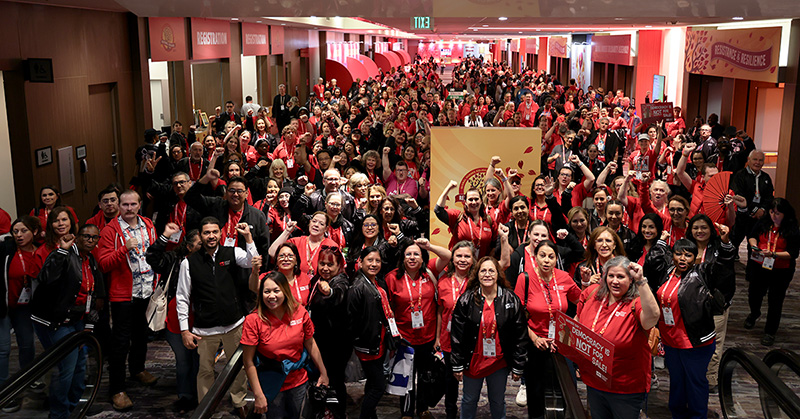Many Fronts, One Fight

U.S. and international nurses join forces at 2025 Global Nurses Solidarity Assembly
By Chuleenan Svetvilas
National Nurse magazine - July | August | September 2025 Issue
When registered nurse Sheriann Weinstein, of Fort Walton-Destin Hospital in Fort Walton Beach, Fla., stood in solidarity with colleagues throughout her hospital, they were able to take on HCA Healthcare and win their September union election. A month later, on Oct. 6 to Oct. 8, Weinstein joined nurses from around the world at National Nurses United’s 2025 Global Nurses Solidarity Assembly (GNSA) — and gained a new understanding of what can happen when the same solidarity powering her own facility fight is raised to global heights.
“I haven’t seen this many nurses in one spot fighting for the same things to help better our families, our community, our world,” said Weinstein. “It’s our whole world that needs help. And there are so many nurses out there willing to stand beside us.”
GNSA was a fusion of NNU along with a meeting of Global Nurses United (GNU), a federation of nurse and health care worker unions in 35 nations cofounded by NNU. The assembly’s theme, “Resistance and Resilience,” was woven throughout panel discussions, continuing education courses, and other opportunities for nurse leaders to share information and resources to bring back to their facilities and home communities.
With the United States and many other nations experiencing a greater level of political division among everyday people in recent years, a major topic of discussion at GNSA was how billionaires, including health care employers, have aligned themselves with authoritarian leaders throughout the globe. Their goal? To keep stoking public division and dismantle government and public institutions, so they can more easily amass outrageous amounts of wealth off the backs of workers, who are too busy fighting one another to survive than hold billionaires accountable. But nurses at GNSA were clear that they don’t stand for “divide and conquer” tactics from their employers or in society.
“I hope that in each other’s company this year, we can learn resilience from one another’s successes and setbacks, share our hopes and our ideas, and establish bonds that will help nurses around the world weather the uncertainty of this time ahead,” said CNA/NNOC President Sandy Reding, RN. “Together, we can build a world where health care rights are treated as human rights, where immigrant rights are treated as human rights, where public health and patient safety come before profits. We certainly can’t do it without one another’s help and solidarity.”
In this time of rising authoritarianism, “working-class solidarity is critical to winning on issues that unite working people and build a just society for patients and our planet,” said CNA/NNOC and NNU Executive Director Puneet Maharaj. Nurses were especially encouraged to hear from nurse and health care worker union leaders in nations where efforts to divide and conquer working people were met with mass resistance — and shut down.
“Authoritarian regimes will threaten unions because it’s the biggest threat to them,” said Korean Health and Medical Workers Union (KHMU) President Hee-sun Choi, RN. CNA/NNOC Veterans Affairs nurses understand this well, as the Trump administration has stripped away the protected union rights of federal workers, including 15,000 VA nurses.
It’s possible to fight back successfully against attacks on working people’s rights, said Choi, describing how the people of South Korea stood together in such massive numbers that they were able to stop former South Korean President Yoon's 2024 attempt to declare martial law. But to fully get Yoon out of office, after his attempt at a military takeover was halted, KHMU nurses prepared for a nationwide strike, along with taking part in ongoing protests, in extremely cold weather. Thanks to their efforts, in solidarity with their fellow working people, martial law only lasted six hours and Yoon was ousted.
“The rise of fascism is a structural shift that threatens the rights and very survival of nurses, patients, and the entire working class. To resist, our solidarity is critical,” said Choi.

Nurses know that safe patient care conditions in U.S. and global hospitals are critical for achieving a healthier nation and world. So issues such as ending workplace violence and winning safe staffing ratios were top of mind at GNSA. Nurses in states and countries that have already won ratios shared strategies and inspiration with nurses still fighting for this critical protection.
“The biggest challenge in my country, they call it a ‘shortage of nurses.’ But is it a shortage of bodies, or a shortage of nurses willing to work in these awful conditions?” said Canadian Federation of Nurses Unions (CFNU) President Linda Silas, RN . The British Columbia Nurses Association (BCNU), a CFNU affiliate, recently won its ratios fight, Silas noted, but nurses can never back down for a moment, throughout the implementation process.
“The government said we need to bring more academics to determine what the ratios will be. BCNU said no, we don’t need more Ph.D.s, we need nurses as expert witnesses,” said Silas.
Nurses also threaded the needle on how even the fight to win safe staffing limits and other safe patient care protections is inherently political because nurses must stand up for their patients in every possible way — including by pushing through and enforcing laws to hold employers accountable.
“Nurses everywhere say ‘Why are we in politics?’ Well, why do you think we have ratios in California?” said CNA/NNOC and NNU President Cathy Kennedy, RN, referring to the 1999 ratios law that CNA RNs won through a grueling, decades-long political fight.
A variety of afternoon CE courses offered at GNSA helped expand on issues woven throughout the event, including A.I. in health care, climate justice, building the labor movement, resisting global assaults on trans patients and gender-affirming care, pandemic preparedness, and more.
“I've been very inspired while I've been here. I did go to the breakout sessions about trans patients and gender-affirming care, and that's just very important to me. I appreciate that CNA/NNOC is fighting for those rights, for our patients, and for all we do for the entire global community,” said Janel Crowley, RN, of Maine Medical Center in Portland, Maine.
“In a class I was in, [a nurse] from Tucson said that we're doing the work for seven generations behind us and seven generations ahead of us,” said Monica Gonzalez, RN, of Ascension Seton Medical Center in Austin, Texas. It caused her to think about how generations of nurses pass through the union, and how her own facility was one of the younger unionized Texas facilities and still learning from union nurses who came before them. But she realized at GNSA that she and her colleagues are also able to “give a hand up” to the Fort Walton nurses.
“I'm getting information [from longtime union nurses], but I'm also handing that information down to future generations of nurses. I just gave myself chills,” said Gonzalez.
Nurses are already voted the most trusted profession year after year in the Gallup poll. At GNSA, they were also reminded that trust in unions is also on the rise, with 9 out of 10 people under 30 trusting unions, according to a 2023 poll by the AFL-CIO. With all that trust, nurses are the right messengers for this moment, GNSA speakers emphasized. The public is looking for leadership on how to achieve a more caring, healthy, just world, and nurses are the leaders to get us there.
“[Unions] are literally more popular than Taylor Swift,” said AFL/CIO president Liz Shuler. “Every other institution is failing to deliver that change people need. Democrats aren’t going to save us. Republicans aren’t going to save us. Working people are going to save ourselves.”
“Through our solidarity, we can give new members and people who want to join a union reasons to have faith in fighting for what we believe in,” said CNA/NNOC President Cokie Giles, RN. “This is our time to get louder, get bigger, and get stronger.”
Part of achieving a healthier world is also protecting the right of all people to experience joy. So GNSA wasn’t all educational sessions. Nurses also had an opportunity to dance, to see resistance movement art, and to attend The People Speak, where actors and artists perform dramatic readings of historical documents and make music to tell the story of social movements from the perspective of ordinary people.
And no gathering of union nurses would be complete without an opportunity to really flex their collective power. So nurses also marched on the billionaires on the final day of GNSA. In their sea of red shirts, RNs filled San Francisco streets, carrying signs declaring “Our democracy is not for sale!” and calling for an end to the genocide in Gaza. As taxi drivers honked and high-fived RNs, and passersby cheered, the nurses chanted, “The nurses, united, can never be defeated!”
“This convention has galvanized my resolve to speak out louder than ever before, even in the face of fear,” said Lisa LaFave, RN, of San Leandro Hospital in San Leandro, Calif. Vanessa Villareal, RN of Ascension Seton Medical Center in Austin, agreed that GNSA was “reenergizing.” As the convention came to a close, she said she is excited to “go back and restructure my unit and get ready to go back to the bargaining table” fueled by what she has learned.
“All my fellow nurses are going to hear about this,” Fort Walton RN Cristine Corona Otero Octtaviani emphasized. “It’s been amazing meeting nurses from all over the world, and what I learned most is everyone is having the same issues we are having here in the United States.”
With many local fronts to their common, global fight, nurses left GNSA more committed than ever before to win the vision of the future they know their patients deserve, where workplaces are safe, and all people have the right to guaranteed health care and a life filled with all forms of justice and free of war.
“Our power grows as more nurses across the country and across the world realize their own power — and the power in our solidarity. Knowing all this, I have only one question for you today,” CNA/NNOC President Michelle Gutierrez Vo asked the crowd of cheering GNSA nurses. “What the hell are we waiting for? We can do this because we are the nurses. The mighty, mighty nurses!”
For more information on the topics covered at GNSA, check out National Nurses United’s latest CE course offerings at: nationalnursesunited.org/ce-classes
Kari Jones is a contributing writer for National Nurse.